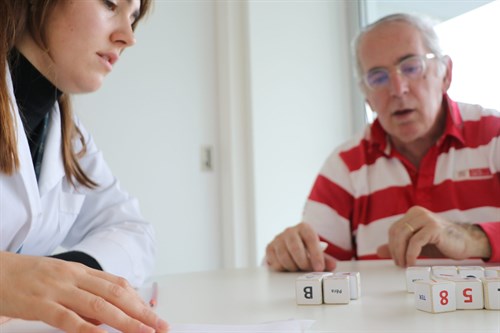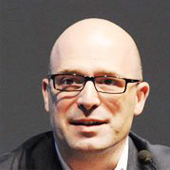PARKINSON'S INDIVIDUAL PROGRAMME
Growing evidence suggests that intensive training and exercise can offer both short- and long-term benefits for people with Parkinson’s disease.

However, given the range of rehabilitation programmes available, choosing the right one can be challenging. To maintain motivation over time and maximise long-term benefits, it is essential to find a programme that matches each person’s specific needs and preferences.
The Individual Parkinson’s Therapeutic Programme is an excellent opportunity to benefit from intensive rehabilitation in a creative and energetic environment. The programme is designed to empower individuals by helping prevent the decline of motor functions, improving physical capacity, boosting motivation and building confidence in daily activities and social interactions — all while promoting overall wellbeing.
The duration of the programme is flexible, although a minimum of two weeks is recommended to achieve the best results.
During the programme, participants stay at a carefully selected hotel near the Campus. Nursing assistants from the Campus provide monitoring and support throughout the night at the hotel. Participants have access to 24/7 assistance and can request help at any time, either from their hotel room or any common area. The training and learning sessions take place at the Campus, set within extensive gardens, featuring an indoor pool, a fully equipped and adapted gym, and an outdoor exercise area.
Watch our customers' OPINIONS
The initial assessment will identify the patient’s problems and determine the individualized treatment plan and objectives to evaluate the progression after the programme. The rehabilitation team and the expert for Parkinson’s, PhD Joaquim Ferreira, will conduct the assessment and issue and Individual Treatment Plan which will set the intensity of the program and adjust results to the clinical condition of the patient. The Treatment Plan is a comprehensive approach that gathers knowledge from different areas, including: Neurology, Physical Rehabilitation, Hydrotherapy, Neuro-rehabilitation, Speech Therapy, Diet and Nutrition and Psychology.
Daily rehabilitation will take up to 6 hours, according to the guidelines set in the Treatment Plan. Exercise programs cover different techniques:
- LSVT LOUD™ and LSVT BIG™ Program Parkinson;
- Nordic Walking Program;
- Hydrotherapy Bad Ragaz and Halliwick in Parkinson;
- Ronnie Gardiner Rhythm Method®;
- Parkinson’s Dance Program ;
- Adapted Parkinson Boxing Aerobic.
The Rehabilitation Team will conduct the Treatment Plan, adjusting intensity to the patient’s tolerance. They will continuously support the patient and supervise the treatment.
Educational sessions aim to explore strategies for better management of daily issues:
- Medication issues;
- Sleep disturbance;
- Common misconceptions;
- Exercise, speech, swallowing and diet tips;
- Balance tips;
- Non-motor issues.
Each participant must:
- Be able to endure a minimum of one hour of exercise per day;
- Be functionally independent;
- Not present major balance problems or history of falls in the last 3 months;
- Not present a degree of cognitive impairment that impacts daily living activities;
- Have a stable medical condition;
- Bring a medical certificate from a doctor (GP or neurologist) attesting that they don’t suffer from a cardiovascular disease or other condition that may preclude them from doing intensive rehabilitation.
Doctors who perform this medical procedure

Neurology
Professor Joaquim Ferreira holds a degree in Medicine and a PHD in Neurology by the Faculdade de Medicina of Universidade de Lisboa.
He is the Director of the European Section of the International Society for Parkinson’s Disease and other Movement Diseases. He is a professor of Neurology and Clinical Pharmacology in Faculdade de Medicina of Universidade de Lisboa and he is responsible for the Unit of Clinical Pharmacology at Instituto de Medicina Molecular.
He is also responsible for the Commitee of Education of the International Society for Movement Disorders.
His main areas of interest are Parkinson’s, movement disorder, neuropharmacology, muscular dystonia, botulin toxin and Huntington’s disease.

